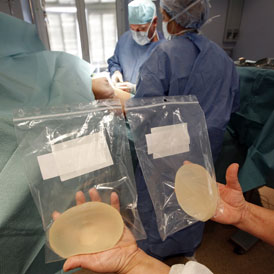I warned government about breast implants – surgeon
A cosmetic surgeon tells Channel 4 News he warned the government 17 months ago that French-made breast implants would become a “national health scare”.
Surgeon Azhar Aslam, who works for Linia Cosmetic Surgery, told Channel 4 News he became concerned in 2008 that PIP implants were rupturing.
In March 2010, the Medicines and Healthcare products Regulatory Agency (MHRA) banned the implants. Three months later, Mr Aslam wrote to the chief medical officer (CMO) outlining his concerns.
‘Health scare’
He said: “I wrote to the chief medical officer on the 2nd of June, 2010, alerting them that since these were already banned now, and there were 40-50,000 patients who may have been affected, at some point this may become a national health scare and will have severe cost implications.”
At some point this may become a national health scare and will have severe cost implications. Surgeon Azhar Aslam
The CMO replied in June 2010, but the letter seems to have gone astray and Mr Aslam said he only received it recently. It said the MHRA “did not yet have any evidence to indicate that the use of the unapproved silicone gel has affected the safety of these implants”.
It added that the French authorities were carrying out tests to see if the implants posed any health risks, and the MHRA was awaiting the results.
In July 2010, Mr Aslam also wrote to the MHRA and was told his letter would be forwarded to its adverse incident centre. Mr Aslam said: “You depend upon a regulator to regulate. it is undoubtedly one of the biggest regulatory failures.”
Linia used PIP implants on hundreds of women. It said: “Where appropriate, implants will be removed and replaced with no fee by the surgeons and for Linia. The cost price may apply. This will be fully discussed with the every patient individually.”
There is no evidence PIP implants damage women’s health, but there are worries they may be more prone to rupture than other products.
Private sector
Most of the 40,000 women who received PIP implants had their operations privately and the government believes clinics should offer free treatment to patients who want them removed and replaced.
The Welsh Government has said private patients can have the operations on the NHS in Wales.
The private company that carried out more operations than any other said it was not prepared to operate for free. The Harley Medical Group, which fitted PIP implants to almost 14,000 British women, said replacing the implants would put it out of business. Another private firm, Transform, has also said it will not replace the implants free of charge.
Other leading providers including BMI Healthcare, Nuffield Health and Spire, have agreed to offer free removal of the PIP implants.
The Hospital Group has said it will only pay to replace PIP implants that have ruptured. Ramsay Health Care, which has around 150 patients with PIP implants, said it was offering concerned women the chance to be examined and, if there was a rupture or clinical need, the implants would be removed and replaced free of charge.

Mr Lansley said: “Eight private companies are offering to replace implants for their patients. Harley Medical Group should follow suit. Today the professional bodies for cosmetic surgery have sent out a letter to all surgeons calling on them not to charge for their time when they remove these implants.
“That should significantly reduce the costs for all companies and I would urge Harley to rethink its decision in light of this. All providers have a duty of care to their patients. It is unacceptable for wrangling over liabilities to get in the way of this. These providers should offer help to women who need it and deal with liabilities later.”
Safety arrangements
The Health Secretary told the Commons that NHS Medical Director Sir Bruce Keogh would look at the safety arrangements for women having implants and whether cosmetic products and operations were properly regulated.
We have set out how the NHS will help patients affected, and we expect the private sector to do the same. Health Secretary Andrew Lansley
He also announced that the Care Quality Commission would carry out a swift review of private clinics that carry out cosmetic surgery, looking at the safety and quality of their procedures.
Mr Lansley said: “My concern throughout this situation has been for the safety and wellbeing of all women with PIP implants. We have set out how the NHS will help patients affected, and we expect the private sector to do the same.
“We must now go further, and this is why I have set out today a number of actions to ensure we learn the lessons and look at how we can tighten up regulation of the wider cosmetic industry so that this doesn’t happen again.”
Tighter regulation
Mr Lansley ordered a previous review at the end of 2011. The government said on 6 January that the inquiry had concluded there was no evidence to recommend the routine removal of PIP implants.
But it said the 5 per cent of women who had had their operations on the NHS and were worried would be able to have them replaced at the taxpayer’s expense.
The inquiry team said it expected private firms to offer the same deal to women who were anxious and also wanted their implants taken out.
If a private clinic has now closed and a former client wants her implants removed, the NHS will foot the bill if her GP decides there are clinical reasons to do so, but it will not pay for replacements. It will also remove implants in these circumstances if a private clinic refuses to treat a former patient.